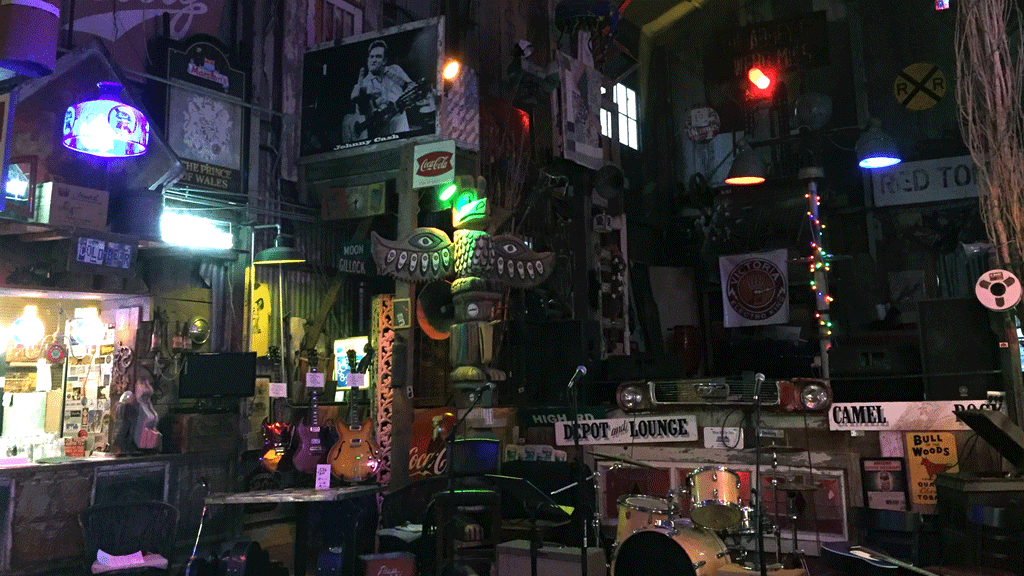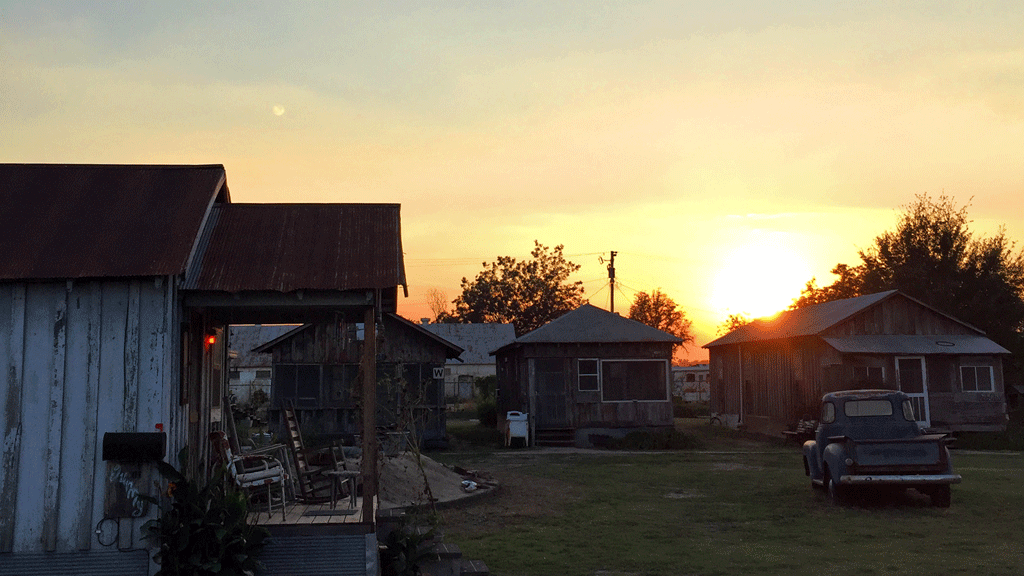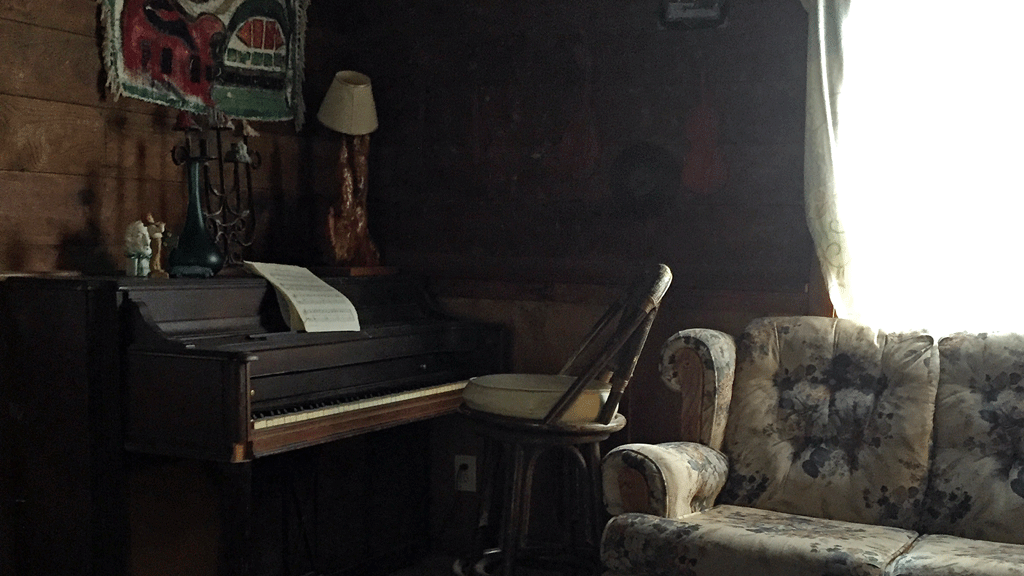I traveled in Mississippi as a guest of Visit the Delta. Nearly all my travel expenses were paid for.
When I arrived at the Shack Up Inn outside Clarksdale, Rust, the onsite bar and restaurant, held a circle of guitar and bass players deep in lessons. I watched for a while before checking in. I had arrived to a music camp — they happen here annually — and unrefined notes floated up toward the high, high ceiling. There was junk everywhere, church signs and stop lights and bobble head Elvises (What is the plural of Elvis? Elvii?) and it was all shabby style, held together with bailing wire and possibly the naive desire of the guests to see plantation life as not much more than picturesque, in retrospect.
I took the keys to my sharecropper shack where I chose to sleep not in the double bed at the back of the house, but in the single next to the window in the front room. There was a piano and very tired couch and a wall mounted propane heater, which I turned on because it had been cold, in the 50s. The walls were covered with graffiti, the towels were the over-laundered texture of the ones you’d take camping. I tried to take a nap, I had not slept well the night before, but it was not to be. The wind was slapping a torn bit of screen against the glass panes of a window at the back of the house, the heater snapped and clicked, the strains of blues harmonica wandered back and forth past my front porch. I gave up and when I went outside, the harmonica was nowhere to be seen but a young guy was softly laying down some notes on a three string cigar box guitar that he’d built himself. I know because I asked.
 In the bar, I ordered catfish tacos and a beer and I waited for open mic, which kept not starting. My dinner was delicious — nearly everywhere I ate the food was well past my expectations — and when the open mic continued to not happen, I gave up and went back to my shack. Later, again, the strains of the blues wandered past my porch but by then, I was settled in with Faulkner and a cup of tea and that was it for the night.
In the bar, I ordered catfish tacos and a beer and I waited for open mic, which kept not starting. My dinner was delicious — nearly everywhere I ate the food was well past my expectations — and when the open mic continued to not happen, I gave up and went back to my shack. Later, again, the strains of the blues wandered past my porch but by then, I was settled in with Faulkner and a cup of tea and that was it for the night.
§
Just about a week later, I was back at the Shack Up. The weather had changed and it was hot and I was in a smaller unit with another exhausted couch and the same sharpie gratified walls with a screen door that opened to the central courtyard. The grounds were a hive of Brits and Germans, they wandered with serious faces snapping photos of the bottle trees and the old pickups. Three leggy young men, Scandinavian, perhaps, all in plaid shorts, stalked about the place and smoked. My shack was hot, highs went to 88 that day, and close, and there was a weird ghost of a smell that troubled me, like a fire put out with beer. The sheets were fresh with laundry detergent and the shower, enclosed in corrugated siding, was a very good one, but I wasn’t as happy this second night here.
I first scratched it up to preferring the company of those who travel with guitars to those who travel with giant camera lenses, and the fact that my shack needed a good airing, but that wasn’t it. It’s that I was grappling with this idea of poverty chic. Isn’t it cool that you can stay in a real sharecropper’s shack, albeit one that has wifi and indoor plumbing and just across the way there are many beers on tap and excellent food? Yes and no and I don’t know. A few days earlier I’d been at Tallahatchie Flats, another stay with a big roadhouse bar and a semi-circle of shacks but there is no graffiti, the little houses are so tidy and almost proud of what they hold and it’s a different feeling to be there. Plus, again, there was music and things felt more right, less like I was in a place to pretend that living this way was somehow a costume you could put on for a day and a night.
§
I detoured off the highway on my first day in Mississippi and ended up in Lula, a grim crossroads of a town. Most of the homes looked damaged or neglected, broken front porches and damaged roof lines and boarded up windows and it was poor. I saw this scene multiple times on my travels; I’d transit some crossroads town with a water tower and a railway line and a boarded up general store and some houses that were in much rougher shape than the shacks I visited at Tallahatchie Flats or the Shack Up Inn. For all I know, the houses were spic and span inside, occupied by people who just didn’t have the cash replace that broken window. Hell, my house needs paint, badly, it’s down to the metal siding on the south and west sides and I’ve not painted for exactly that reason, cash. I looked, the median income per household in Lula was about 23,000, so that’s not exactly rebuild the front porch level income.
I talked with my friend Shelia, she’d stayed at the Shack Up too and she suggested that a place like that is the only way you can get at what it might have felt like to be in those times, in the dark and the wind with the roof rattling overhead and the screen door slapping. I couldn’t make that transitive leap of time periods because of what I’d seen from 2015, now, just a few miles away.
§
The Shack Up Inn is completely unapologetic about what they are, so it’s not like I’d been somehow misled. What I did not know was how I’d react to this odd commodification of the hard life of southern sharecroppers, and to the way others needed to claim it, their names scrawled all over the plywood walls, the ceiling beams, everywhere, names of travelers from England and Germany and France too. I can’t know if they suffered the same cognitive dissonance I felt, if they turned north towards Lula and while driving through there thought, “Oh, these Americans, this level of poverty is criminal, how can they let their people live like this” even while they paid to experience a romanticized historical facsimile of the same crippling hardship.
The Shack Up Inn is not for everyone. Neither is Tallahatchie Flats, for that matter and both places are as good as any to have an existential crisis about the role history plays in travel. I don’t know if you should stay at either place, it really depends on who you are. These are not, perhaps, places for overthinkers. But if you do, you should skip the Faulkner, make sure there is live music, and chill the fuck out. There is a lot of good beer at the bar, and if one is not enough calm the noise in your brain, order another round. The real thing is just a few miles up the road and it will absolutely still be there in the morning, staring you right in the face.



I enjoyed the series of posts on Mississippi. I have only put a toe into the state–having spent a night in Natchez–but would like to go back and explore. Just spent a few days in Richmond, Virginia. The South is uniquely able to challenge my perceptions of where we sit as a country with respect to race and class, much more so then, say, a visit to Portland. Anyway, Mississippi seems to be having a literary “travel writer” moment, with Theroux publishing his book (and an interesting op-ed, in case you missed it: http://www.nytimes.com/2015/10/04/opinion/sunday/the-hypocrisy-of-helping-the-poor.html).
I rather enjoyed that weird op-ed, and I’d read another write up of Theroux’s new book about the south shortly before my trip. Crazy that it should be a thing just as I went there.